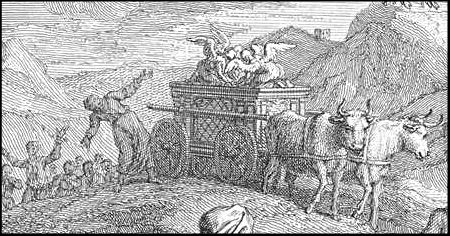Category: Obedience
Subject: Obedience
The Patternists: Carrying the Ark

The ark of the covenant had a long history with Israel, serving as the point of interaction between God and the nation from the time the tabernacle was erected in the wilderness (cf. Exodus 40:17-21,34).
In the building of the ark, rings were set at each of its four corners, and poles of acacia wood, overlaid with gold were put into the rings, “to bear the ark.” (Exodus 37:3-5). After the establishment of the priesthood as found in the book of Leviticus, it fell upon the Levites to care for and bear the ark as the tabernacle was moved from place to place (Numbers 1:49-53; 3:31). The actual directions given concerning the packing and carrying of all the furniture in the tabernacle is revealed in Numbers 4, ending with these instructions, “And when Aaron and his sons have finished covering the sanctuary and all the furnishings of the sanctuary, when the camp is set to go, then the sons of Kohath shall come to carry them; but they shall not touch any holy thing, lest they die. These are the things in the tabernacle of meeting which the sons of Kohath are to carry” (15). The poles were inserted into the ark to allow it to be carried, without touching it or the holy things stored upon it. Not only was the Levite family of Kohath not to touch the ark, God told Moses, “But they shall not go in to watch while the holy things are being covered, lest they die” (20).
The Patternists: David and the Temple
In 1 Chronicles 17:1, David showed a sincere heart in his desire to build a permanent Temple to honor God. “Now it came to pass, when David was dwelling in his house, that David said to Nathan the prophet, ‘See now, I dwell in a house of cedar, but the ark of the covenant of the Lord is under tent curtains.”
Interestingly, it seems that Nathan’s response to David was presumptuous. That is, it came from Nathan himself, rather than from God. Nathan said to David, “Do all that is in your heart, for God is with you” (17:2). Much of Nathan’s words were accurate. David was certainly a righteous king, and in general his reign was in accord with God’s purpose. However, it was wrong for Nathan to assume God would desire for David to build the temple.
The Patternists: A Conditional Covenant
There are a number of agreements, or covenants which the Lord has entered into with mankind. Some of these covenants were unconditional. Some had conditions appended to them.
After God had destroyed the world with the flood, he placed a bow in the cloud, with the promise that he would never again destroy the world by water. No conditions were placed on this. It was God’s decision, regardless of man’s actions.
Continue reading “The Patternists: A Conditional Covenant” →
Sermon: Principles of Leadership
Jehoshaphat was an outstanding king of Judah. By looking at his character and reign, we can learn a great deal about the need for godly leadership in our country, homes and churches.
The Patternists: “They Understood the Words”
The eighth chapter of Nehemiah is a wonderful narrative to help establish the importance of knowing and following the will of the Lord.
On this occasion, following the rebuilding and defense of the wall which had been erected to protect Jerusalem, the remnant of Judah (released from captivity), gathered together for a reading of the law. There were a number of times during Israel’s history where a renewal of the covenant between God and His people were made. It happened prior to Moses’ death in Moab (Deuteronomy 29). It happened again as Joshua neared his death (Joshua 24). When the lost law was found again during the reign of Josiah, he made the people commit to the covenant (2 Kings 23).
Continue reading “The Patternists: “They Understood the Words”” →
The Patternists: Solomon’s Heart Turns from the Lord
“But King Solomon loved many foreign women, as well as the daughter of Pharaoh: women of the Moabites, Ammonites, Edomites, Sidonians, and Hittites — from the nations of whom the Lord had said to the children of Israel, ‘You shall not intermarry with them, nor they with you. Surely they will turn away your hearts after their gods.’ Solomon clung to these in love.” (1 Kings 11:1-2).
This passage is one among several that should give pause to every Christian of marrying age. Love is a powerful thing. Over the years, I have witnessed many Christians who have had their hearts turned away from God because of matters of the heart.
Much discussion has been had regarding whether a Christian should marry a non-Christian. Is it a sin? Is it allowed? Is it best?
Continue reading “The Patternists: Solomon’s Heart Turns from the Lord” →
Wisdom in Living
“The law of the wise is a fountain of life, to turn one away from the snares of death. Good understanding gains favor, but the way of the unfaithful is hard” (Proverbs 13:14-15).
So many today chafe against the rule of law. The idea of freedom (a legitimate aspect of our democracy) has been abused by those who seek to be libertines. Where once our society understood that our freedoms require constant restraint and voluntary cooperation, now many believe that freedom equates to a selfish lifestyle. I can do whatever I want, regardless of how it might impact others.
The Christian has always understood that freedom requires personal restraint. In order to be free in Christ, we must accept His Lordship! In other words, become “a bondservant of Christ” (Colossians 4:12).
Our text indicates that law (whether the physical laws of man, or the spiritual law of Christ) “is a fountain of life.” And, “the way of the unfaithful is hard!”
The promise of lawlessness is never fulfilled. “While they promise them liberty, they themselves are slaves of corruption; for by whom a person is overcome, by him also he is brought into bondage” (2 Peter 2:19). Sin entangles, ensnares. Truly the way of the unfaithful is both hard and foolish.
If you want to live a peaceful life, obey the civil authorities (cf. Romans 13:1-7). If you want to go to heaven, obey God! (cf. 2 Thessalonians 1:3-10).
Click below to…
Work Out Your Own Salvation
“Therefore, my beloved, as you have always obeyed, not as in my presence only, but now much more in my absence, work out your own salvation with fear and trembling; for it is God who works in you both to will and to do for His good pleasure” (Philippians 2:12-13).
Paul’s admonition here is also partly a word of praise for the faithfulness of the Philippian brethren. They had shown themselves to be obedient in the past, he calls upon them to continue. A significant point made in the passage is that continued obedience is necessary to be saved. The idea of working out “your own salvation” is not in any way at odds with the concept of grace. God requires faithfulness unto death to receive the crown of life! (cf. Revelation 2:10). Paul himself told them, “I press toward the goal for the prize of the upward call of God in Christ Jesus” (Philippians 3:14).
The Patternists: Was Paul a Patternist?
A careful reading of Paul’s epistles show that he expected careful obedience to the instructions he gave by the Spirit’s inspiration. In other words, Paul was establishing a pattern for his readers to follow. Their standing with God was dependent upon their following that pattern. Notice the following scriptures which bear this out.
“For in it [the gospel] the righteousness of God is revealed from faith to faith; as it is written, ‘The just shall live by faith’” (Romans 1:17).
“Now I urge you, brethren, note those who cause divisions and offenses, contrary to the doctrine which you learned, and avoid them” (Romans 16:17).
“If anyone defiles the temple of God, God will destroy him. For the temple of God is holy, which temple you are” (1 Corinthians 3:17).
Continue reading “The Patternists: Was Paul a Patternist?” →
Sermon: No Hurry
Complacent individuals believe that they can wait until later to begin to serve the Lord. This malady affects Christians and non-Christians alike. The gospel is replete with admonitions to urgency in obeying God!
Sermon: Stop Waiting in Line!
The spiritual blessing we receive in Christ, we do not have to wait to receive. We must only seek them diligently, and God will provide. This includes the salvation of our souls!
The Patternists: Faithfulness and Industry
In his second letter to the Thessalonians, Paul gave thanks to God for them. They were “beloved by the Lord”, as He chose them “for salvation” (2:13). He called them by the “gospel” (cf. Romans 1:16), so that they might obtain “the glory of our Lord Jesus Christ.” (2:14). In these words their standing as God’s children is well established.
Paul did not stop with commending them for their faith. He did not just give thanks for the standing they enjoyed. He in the remainder of this chapter and beginning of the next exhorted them to faithfulness and industry, working for the Lord. This is similar to what he wrote to the Ephesians in Ephesians 2:8-10, “For by grace you have been saved through faith, and that not of yourselves; it is the gift of God, not of works, lest anyone should boast. For we are His workmanship, created in Christ Jesus for good works, which God prepared beforehand that we should walk in them.”
Continue reading “The Patternists: Faithfulness and Industry” →
Sermon: The Roles of Joshua, Son of Nun
Joshua serves as a wonderful example of faithfulness in every role he held in his life. Whether as a son, a slave, a servant, soldier, or spy. He saved his people, and is among those set apart by God. May we faithfully serve God as he did.
COVID-19 (30) Be Careful
In Titus 3, Paul gave instructions to the evangelist Titus. He wrote, “This is a faithful saying, and these things I want you to affirm constantly, that those who have believed in God should be careful to maintain good works. These things are good and profitable to men.”
The frequency
Paul told Titus to affirm the truth constantly. The phrase is not translated consistently by English versions. While the KJV and NKJV say to “affirm constantly”, the ESV says “to insist”, and the ASV to “affirm confidently.” Young’s Literal translation says, to “affirm fully.” Regardless of the different words used, the translations are not far apart in expressing the intent of Paul’s admonition.
COVID-19 (9) For What Is Your Life?

James referred to a specific arrogance present among his readers. “Come now, you who say, ‘Today or tomorrow we will go to such and such a city, spend a year there, buy and sell, and make a profit'” (4:13). Doesn’t that perfectly describe our culture, pre-COVID-19? The world was speeding along, unconcerned, living life to the fullest. Few were worried about the possibility of a pandemic that would cripple the world’s economy, and would inspire talk of a “new normal” that would include social distancing and foundational changes.
We have been given a wake up call. James answered those mentioned in the above verse with these words, “whereas you do not know what will happen tomorrow. For what is your life? It is even a vapor that appears for a little time and then vanishes away” (2:14). All of us today are a bit more aware of our own mortality. Though the virus is not deadly to all, the daily count that we see on every news program is sobering. Carefree days are over. People are scared, and are beginning to realize the frailty of life. We are not quite as in control as we thought we were.

















